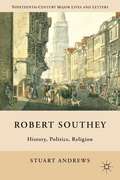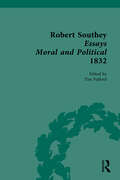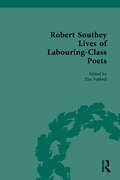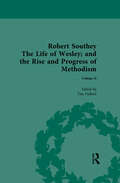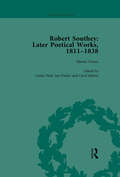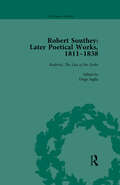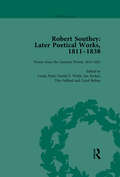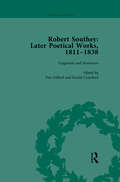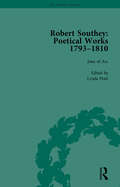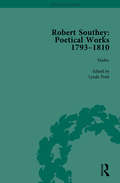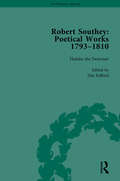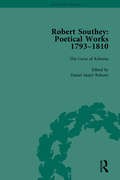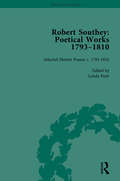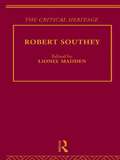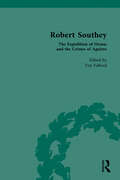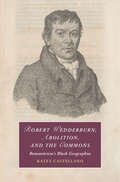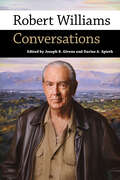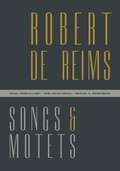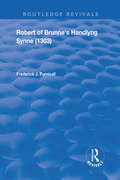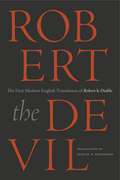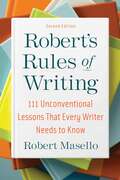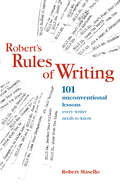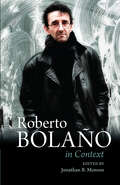- Table View
- List View
Robert Southey
by Stuart AndrewsIn"Robert Southey," Andrews""argues that Robert Southey'sdenunciation of global Catholicism is essential to understanding his life, works, and times. On this issue, Southey was absolutely consistent - from his first visit to Lisbon in 1795-6 to his "Colloquies" published in 1829. The Poet Laureate's partisan rhetoric reflect its intensity and reveal a great deal about the religious culture of this stormy period in England. "
Robert Southey Essays Moral and Political 1832
by Tim FulfordRobert Southey's Essays Moral and Political, originally published in 1832, brings together many of Southey’s most influential journal pieces, providing important evidence for students of the political and literary culture of the Romantic period. Edited by Tim Fulford, this volume features a full introduction and detailed editorial notes setting the Essays in their contexts. The volume sets the Essays in the context of the political and social issues and controversies on which they comment, and will be of great interest to students and scholars of Literary and Political History.
Robert Southey Lives of Labouring-Class Poets
by Tim FulfordThe Lives of Uneducated Poets, written by Robert Southey and published in 1831, unites several poets under the ‘uneducated’ banner, being the first to identify them as a group and claiming their their writing was worth consideration as that of a class. The book's foundational role contributes to the current interest in labouring-class/self-educated poetry and nineteenth-century history and culture. Accompanied by a new introduction written by Southey scholar Tim Fulford, this title will be of great interest to students and scholars of Literary History.
Robert Southey and the Contexts of English Romanticism (The\nineteenth Century Ser.)
by Lynda PrattLynda Pratt's collection of specially commissioned essays is the first edited volume devoted to the multiple connections between Robert Southey (1774-1843) and English Romantic culture. A major and highly controversial personage in his own day, Southey has until recently been the forgotten member of the Lake School.
Robert Southey, The Life of Wesley; and the Rise and Progress of Methodism (Routledge Historical Resources)
by Tim FulfordThe Life of Wesley was one of Southey’s most influential and bestselling works. It was the first biography of John Wesley – the major figure in the largest religious movement of the eighteenth century – to be published by anyone beyond the Methodist community. In addition, it was a major history of the rise of a phenomenon that Southey and many others saw as a defining sign of contemporary history – the rise of sectarianism and of religious cults. This two-volume edition will represent the full text of the 1820 edition. It will include a comprehensive critical apparatus that will make sense of the major issues posed by the text and how it contributes to studies of both Southey and Romanticism. The edition will feature a critical and contextual introduction, which will set out the origins and composition of the text together with its publication history, as well as offer a carefully considered view of the interplay between the Life and other biographies of Wesley and accounts of Methodism, bringing into view the wide array of sources and influences Southey drew from. It will also examine the book’s reception history, incorporating material from reviews of the period and detailing the controversy it caused in the Methodist community.
Robert Southey: Later Poetical Works, 1811-1838 Vol 1
by Tim Fulford Rachel Crawford Diego Saglia Carol Bolton Lynda Pratt Ian Packer Daniel E WhiteCentral to any reappraisal of Southey’s mid to late career, is 'Roderick'. This best-selling epic romance has not been republished since 1838 and is contextualised here within Southey’s wider oeuvre. The four-volume edition also benefits from a general introduction, volume introductions, textual variants, endnotes and a consolidated index.
Robert Southey: Later Poetical Works, 1811-1838 Vol 2
by Tim Fulford Rachel Crawford Diego Saglia Carol Bolton Lynda Pratt Ian Packer Daniel E WhiteCentral to any reappraisal of Southey’s mid to late career, is 'Roderick'. This best-selling epic romance has not been republished since 1838 and is contextualised here within Southey’s wider oeuvre. The four-volume edition also benefits from a general introduction, volume introductions, textual variants, endnotes and a consolidated index.
Robert Southey: Later Poetical Works, 1811-1838 Vol 3
by Tim Fulford Rachel Crawford Diego Saglia Carol Bolton Lynda Pratt Ian Packer Daniel E WhiteCentral to any reappraisal of Southey’s mid to late career, is 'Roderick'. This best-selling epic romance has not been republished since 1838 and is contextualised here within Southey’s wider oeuvre. The four-volume edition also benefits from a general introduction, volume introductions, textual variants, endnotes and a consolidated index.
Robert Southey: Later Poetical Works, 1811-1838 Vol 4
by Tim Fulford Rachel Crawford Diego Saglia Carol Bolton Lynda Pratt Ian Packer Daniel E WhiteCentral to any reappraisal of Southey’s mid to late career, is 'Roderick'. This best-selling epic romance has not been republished since 1838 and is contextualised here within Southey’s wider oeuvre. The four-volume edition also benefits from a general introduction, volume introductions, textual variants, endnotes and a consolidated index.
Robert Southey: Poetical Works 1793–1810 Vol 1
by Tim Fulford Daniel Roberts Lynda PrattThis edition of Robert Southey's early poetry seeks to restore Southey the poet to his place at the centre of late 18th and early 19th century British literary culture. This collection of his poetical works critically reassesses Southey's epics and romances.
Robert Southey: Poetical Works 1793–1810 Vol 2
by Tim Fulford Daniel Roberts Lynda PrattThis edition of Robert Southey's early poetry seeks to restore Southey the poet to his place at the centre of late 18th and early 19th century British literary culture. This collection of his poetical works critically reassesses Southey's epics and romances.
Robert Southey: Poetical Works 1793–1810 Vol 3
by Tim Fulford Daniel Roberts Lynda PrattThis edition of Robert Southey's early poetry seeks to restore Southey the poet to his place at the centre of late 18th and early 19th century British literary culture. This collection of his poetical works critically reassesses Southey's epics and romances.
Robert Southey: Poetical Works 1793–1810 Vol 4
by Tim Fulford Daniel Roberts Lynda PrattThis edition of Robert Southey's early poetry seeks to restore Southey the poet to his place at the centre of late 18th and early 19th century British literary culture. This collection of his poetical works critically reassesses Southey's epics and romances.
Robert Southey: Poetical Works 1793–1810 Vol 5
by Tim Fulford Daniel Roberts Lynda PrattThis edition of Robert Southey's early poetry seeks to restore Southey the poet to his place at the centre of late 18th and early 19th century British literary culture. This collection of his poetical works critically reassesses Southey's epics and romances.
Robert Southey: The Critical Heritage (Critical Heritage Ser.)
by Lionel MaddenThe Critical Heritage gathers together a large body of critical sources on major figures in literature. Each vlume presents contemporary responses to a writer's work, enabling the student or researcher to read the material themselves.
Robert Southey: The Expedition of Orsua; and the Crimes of Aguirre
by Tim FulfordFirst published in 1821, Robert Southey’s 'Expedition of Orsua and the Crimes of Aguirre' is the first account in English of one of the earliest expeditions down the Amazon River, made in the years 1560-1 by a renegade band of Spanish conquistadors in search of El Dorado.This sensational story features mutiny, madness, and murder– the total breakdown of order among power-hungry colonists as they are carried further and further into the immense jungle and further and further from European settlements. This edition contains a comprehensive critical apparatus that make sense of the major issues posed by the text and show how it contributes to studies of Southey, of colonialism and of travel/exploration writing in the nineteenth century more widely. The volume features a critical and contextual introduction, which sets out the origins and composition of the text together with its publication history, as well as offer a carefully considered view of the interplay between it and other narratives of exploration of the period, bringing into view the wide array of sources and influences Southey drew from.This book will be of interest to students and scholars of 19th century literature and history.
Robert Wedderburn, Abolition, and the Commons: Romanticism's Black Geographies (Cambridge Studies in Romanticism)
by Katey CastellanoBuilding on scholarship in Romanticism, Black studies, and environmental humanities, this book follows the political thought of Robert Wedderburn, a Black Romantic-era writer. Wedderburn was deeply influenced by his enslaved mother and grandmother, who raised him in Jamaica. After migrating to London, he became a key figure in ultraradical circles and was prosecuted by the British government for blasphemous libel. Wedderburn's vision for abolition from below sought to forge a transatlantic alliance between English agrarian radicals and enslaved people in the Caribbean. Instead of emancipation administered by British colonial and commercial interests, Wedderburn championed the ecological projects of enslaved and Maroon communities in the Caribbean as models for liberation. His stories of Black, place-based opposition to slavery provide an innovative lens for rereading significant aspects of the Romantic period, including the abolition of slavery, landscape aesthetics, and nineteenth-century radical politics.
Robert Williams: Conversations (Conversations with Comic Artists Series)
by Joseph R. Givens and Darius A. SpiethA legendary figure of underground comix, Robert Williams (b. 1943) is an important social chronicler of American popular culture. The interviews assembled in Robert Williams: Conversations attest to his rhetorical powers, which match the high level of energy evident in his underground comix and action-filled canvases.The public perception of Williams was largely defined by two events. In 1987, Guns N’ Roses licensed a Williams painting for the cover of their best-selling album Appetite for Destruction. However, Williams’s cover art stirred controversies and was moved to the inside of the album. The second defining event was Williams’s participation in the Helter Skelter exhibition at the Los Angeles Museum of Contemporary Art in 1992. Protests ensued when a room was set aside to feature his work. Uncovering long-forgotten and hard-to-find interviews, this collection serves as a social chronicle of counterculture from the 1960s through the early 2000s. One of the founders of the original ZAP Comix collective in the 1960s, Williams drew inspiration from pulp fiction, hot rod culture, pin-up girls, and traditional academic art. He invented the comics character Cootchy Cooty and worked for the studios of Ed “Big Daddy” Roth. He rubbed shoulders with outlaw motorcycle gangs and tested the legal limits of what was permissible comic book art during his day. He has often been described as a figure courting scandal and controversy, a reputation he discusses repeatedly in some of the interviews here. Since the 1980s, Williams has emerged as a force in the fine art world, raising interesting questions about how painting and comic art interrelate.
Robert de Reims: Songs and Motets
by Robert de ReimsRobert de Reims, also known as "La Chievre de Rains," was among the earliest trouvères—poet-composers who were contemporaries of the troubadours but who wrote in the dialects of northern France. This critical edition provides new translations into English and modern French of all the songs and motets ascribed to him, along with the original texts, the extant music, and a substantive introduction.Active sometime between 1190 and 1220, Robert was an influential figure in the literary circles of Arras. Thirteen compositions set to music are here attributed to him, including nine chansons and four polyphonic motets that were broadly disseminated in the thirteenth century and beyond. Robert’s work is exceptional on a number of fronts. He lavished particular care on the phonic harmony of his words. Acoustic luxuriance and expertise in rhyming, grounded in the play of echoes and variation (often extending into the music), constitute the hallmark of his poetry. Moreover, he is the earliest trouvère known to have composed a parodic sotte chanson contre Amours (silly song against Love).Located clearly at the nexus of monophonic song and polyphony, Robert’s corpus also poses the intriguing question of trouvère participation in the development of the polyphonic repertory. The case of Robert de Reims jostles and tempers the standard history of the chanson and motet.Accessible and instructive, this trilingual critical edition of his complete works makes the oeuvre of this innovative and consequential trouvère available in one volume for the first time.
Robert de Reims: Songs and Motets
by Robert de ReimsRobert de Reims, also known as “La Chievre de Rains,” was among the earliest trouvères—poet-composers who were contemporaries of the troubadours but who wrote in the dialects of northern France. This critical edition provides new translations into English and modern French of all the songs and motets ascribed to him, along with the original texts, the extant music, and a substantive introduction.Active sometime between 1190 and 1220, Robert was an influential figure in the literary circles of Arras. Thirteen compositions set to music are here attributed to him, including nine chansons and four polyphonic motets that were broadly disseminated in the thirteenth century and beyond. Robert’s work is exceptional on a number of fronts. He lavished particular care on the phonic harmony of his words. Acoustic luxuriance and expertise in rhyming, grounded in the play of echoes and variation (often extending into the music), constitute the hallmark of his poetry. Moreover, he is the earliest trouvère known to have composed a parodic sotte chanson contre Amours (silly song against Love).Located clearly at the nexus of monophonic song and polyphony, Robert’s corpus also poses the intriguing question of trouvère participation in the development of the polyphonic repertory. The case of Robert de Reims jostles and tempers the standard history of the chanson and motet.Accessible and instructive, this trilingual critical edition of his complete works makes the oeuvre of this innovative and consequential trouvère available in one volume for the first time.
Robert of Brunne's Handlyng Synne: And its French Original (Routledge Revivals)
by Frederick J. FurnivallPublished in 1901, this book provides an English and French version of the 1303 text by Robert Manning of Brunne. Handlyng Synne was adapted from an Anglo-Norman work attributed to William of Waddington, the Manuel de Pechiez. It consists of more than 12,000 lines of verse, arranged in four-stress couplets. It is a discussion of the ten commandments, the seven deadly sins, the seven sacraments, and the elements of confession, illustrated throughout by exempla, or moral anecdotes, thirteen of which do not appear in the Manuel. Handlyng Synne has been described as "a reduction of the world's experience to a comprehensive moral scheme"
Robert the Devil: The First Modern English Translation of Robert le Diable, an Anonymous French Romance of the Thirteenth Century
by Samuel N. RosenbergSamuel N. Rosenberg, one of the premier translators of Old French, presents in this volume the first modern English-language version of the thirteenth-century French romance Robert le Diable, a tale of supernatural birth and spiritual redemption. Robert is born after his mother, a childless noblewoman, secretly calls upon Satan to help her conceive. His wicked behavior as a boy and, later, as a destructive young man is so brutal that one day Robert prevails upon his mother to reveal the secret of his birth and thus the source of his wickedness. Upon learning the truth, he leaves his privileged home in Normandy to seek salvation. Robert’s lengthy penance—under the aegis of the Pope and a pious hermit—begins with his acting as a mute fool in the Roman Emperor’s court and ends with his sainthood. In between he plays the hero’s role in defeating the Turks in battle and turns down the hand of the Emperor’s daughter in marriage, choosing instead to return to the hermit’s abode. The legend of Robert le Diable was extraordinarily influential in the seven hundred years after its creation, generating new versions and adaptations in various languages, ranging from sixteenth-century English adaptations by Wynken de Worde and Thomas Lodge to Giacomo Meyerbeer’s esteemed 1831 opera. Framed by a thoughtful introduction and thorough bibliography, this accessible translation renders the original octosyllabic rhymed couplets of the metrical Old French romance in energetic free verse.
Robert's Rules of Writing, Second Edition: 111 Unconventional Lessons That Every Writer Needs to Know
by Robert MaselloBestselling author Robert Masello guides working and aspiring writers alike with the hard-won advice, tricks of the trade, and indispensable encouragement that only a seasoned professional can provide.Although there&’s no shortage of books on writing and publishing, there&’s none quite like Robert&’s Rules of Writing: 111 Unconventional Lessons Every Writer Needs to Know. Drawing on his many years of experience as an award-winning journalist, TV writer, and the author of over twenty books published by mainstream houses and translated, to date, into nineteen languages, Robert Masello addresses all the issues that confront, and all the problems that beset, writers of all stripes.Whether you&’re working on a novel or a script, a memoir or a blog, an epic poem or a newspaper piece, you&’re going to have to find the best way to express yourself clearly, persuasively, and entertainingly. You&’ll have to find your own personal voice (much harder than it sounds) and use that unique voice to convey your story, your thoughts, and your opinions, to the many readers out there that you&’re eager to reach; with complete candor and welcome irreverence, Robert&’s Rules of Writing offers the inside knowledge that will help you do just that. As provocative as they are amusing, these rules are purposely designed to challenge the old axioms and get you thinking afresh about your work.In well over a hundred short but pithy takes, Masello guides you over hurdles, around obstacles, and through the seemingly insurmountable barriers to completion and ultimately publication—hooray!—of your writing. It&’s a lively, thought-provoking, and often downright funny addition to any veteran, or fledgling, writer&’s shelf.
Robert's Rules of Writing: 101 Unconventional Lessons Every Writer Needs to Know
by Robert MaselloThe 101 Rules You Need to Know *but no one has ever told you You already have a million writing books. You know the principles, the lectures, the "expert" techniques. And you've discovered that sometimes tried-and-true just equals tired. In Robert's Rules of Writing, successful author Robert Masello stomps out status quo writing advice and delivers 101 uninhibited techniques to improve your writing that include: Burn your journal (See rule 1) Strip down to your briefs (See rule 38) Spend time gossiping (See rule 61) Buy the smoking jacket (See rule 56) Skip the Starbucks (See rule 7) De-claim! De-claim! (See rule 63) Whether you're a fiction writer, freelancer, memoirist, or screenwriter, Robert's Rules of Writing gives you the unorthodox advice to transform your writing life and get published!
Roberto Bolaño In Context (Literature in Context)
by Jonathan B. MonroeFrom his first fifteen years in Chile, to his nine years in Mexico City from 1968 to 1977, to the quarter of a century he lived and worked in the Blanes-Barcelona area on the Costa Brava in Spain through his death in 2003, Roberto Bolaño developed into an astonishingly diverse, prolific writer. He is one of the most consequential and widely read of his generation in any language. Increasingly recognized not only in Latin America, but as a major figure in World Literature, Bolaño is an essential writer for the 21st century world. This volume provides a comprehensive mapping of the pivotal contexts, events, stages, and influences shaping Bolaño's writing. As the wide-ranging investigations of this volume's 30 distinguished scholars show, Bolaño's influence and impact will shape literary cultures worldwide for years to come.
